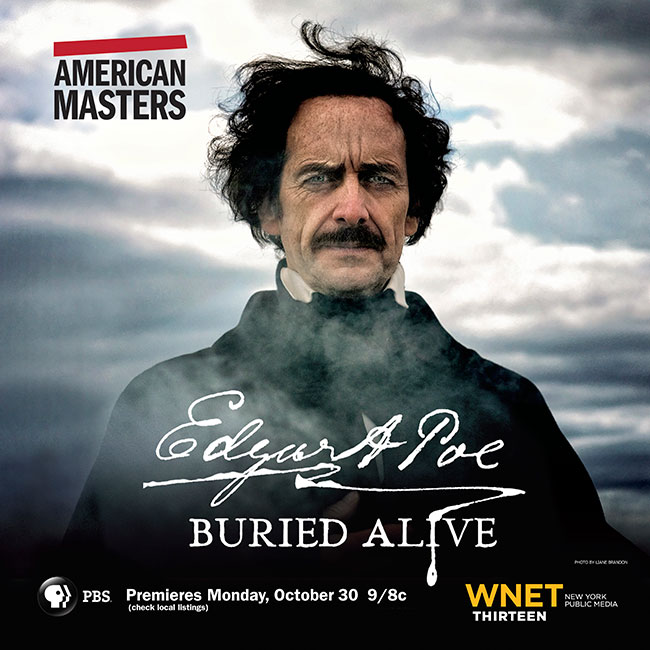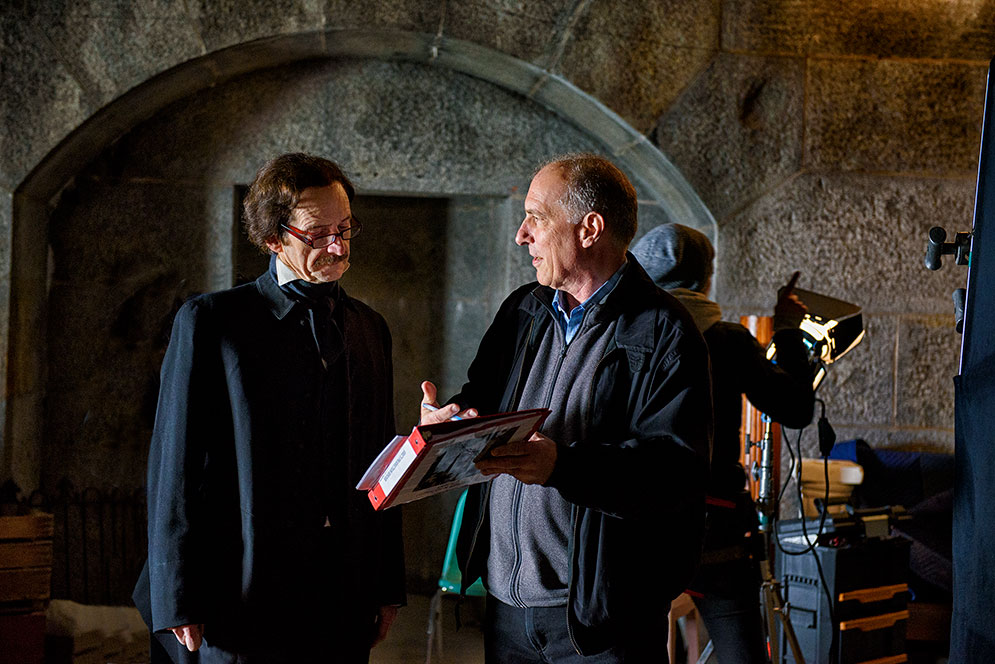EDGAR ALLAN POE IS OFTEN PERCEIVED AS an eccentric loner, scribbling tales of murderous madmen who hide bodies in catacombs and under floorboards. But documentary filmmaker Eric Stange wants to present a fuller picture of Poe, who—in addition to writing sensational fiction to pay his bills—sought to shape literary tastes in 19th century America as a serious poet, editor, and critic.
“He was a tastemaker. He was part of the glitterati of the time,” says Stange (COM’79). “It was important to me to get people to see him in that light, as opposed to just this dark horror writer on the edges of things.”
Stange’s documentary Edgar Allan Poe: Buried Alive will air nationally this fall as part of the PBS series American Masters. The film opens with Poe’s mysterious death at 40 in Baltimore in 1849 and then recounts his life—from his birth in Boston to actress Eliza Poe, to his upbringing in Virginia by foster parents Fanny and John Allan and through his frequent moves between Richmond, Boston, Baltimore, New York, and Philadelphia as he chased literary fame and an end to the poverty that plagued him.
One of the challenges Stange faced was describing a figure as contradictory as Poe. “For every fact you think you can state about Edgar Allan Poe,” he says, “there’s an equal and opposite fact.
You can say he was a loving, doting husband to his wife, Virginia, but at the same time he could be terrible to her. And you can say he was a wonderful poet, and some of his poetry is just brilliant and beautiful, and then there’s some really schlocky, terrible poems.”
He also had to contend with a lack of visual materials. “Any film subject that dates before the era of photographs and film is going to be a challenge,” he says. Part of his solution was to film dramatized scenes, with an actor in period costume reading from Poe’s letters, diaries, and other writings.
The actor who portrays Poe—Denis O’Hare, a Tony-winning Broadway performer also known for playing vampire Russell Edgington on HBO’s True Blood—had no rehearsal before filming but came fully prepared for the role.  “When we film these scenes,” Stange says, “we’re spending a lot of money, hiring a big crew—stuff that as a documentary filmmaker I don’t usually do—and so it’s an incredible sense of relief and gratitude to have an actor who takes it seriously and delivers.”
“When we film these scenes,” Stange says, “we’re spending a lot of money, hiring a big crew—stuff that as a documentary filmmaker I don’t usually do—and so it’s an incredible sense of relief and gratitude to have an actor who takes it seriously and delivers.”
Several BU alumni worked on the film with Stange, including director of photography Boyd Estus (Questrom’65) and still photographer Liane Brandon (CAS’62, SED’67). The film is dedicated to the late Wallace Coberg, who attended the College of Fine Arts and whose enthusiasm for Poe was the film’s impetus. Coberg secured initial funding for the project and had planned to cowrite the script but died of a heart attack soon after he and Stange began collaborating. “Wally convinced me very compellingly that Poe was a good subject for a film,”says Stange.“It would not have been my idea, but he was so passionate and so informed. He was a great guide to get to know Poe.”
Stange says he hopes the film fulfills Coberg’s goal of correcting the record about Poe, bringing him out from the shadow of his own horror stories. Still, PBS plans to air the documentary on October 30, and Stange suspects it will show the film around Halloween in future years.














































 “When we film these scenes,” Stange says, “we’re spending a lot of money, hiring a big crew—stuff that as a documentary filmmaker I don’t usually do—and so it’s an incredible sense of relief and gratitude to have an actor who takes it seriously and delivers.”
“When we film these scenes,” Stange says, “we’re spending a lot of money, hiring a big crew—stuff that as a documentary filmmaker I don’t usually do—and so it’s an incredible sense of relief and gratitude to have an actor who takes it seriously and delivers.”
Related Stories
Gay Couple, Surrogate Mother Subject of New Documentary
The Guys Next Door COM alum’s feature-length directorial debut
Comedy Troupe Asperger’s Are Us Stars In New Documentary
Film premiered in March at South by Southwest
BU Alums Star in New Documentary, The Frozen Chosen
Film focuses on story of real-life evangelical church planters
Post Your Comment